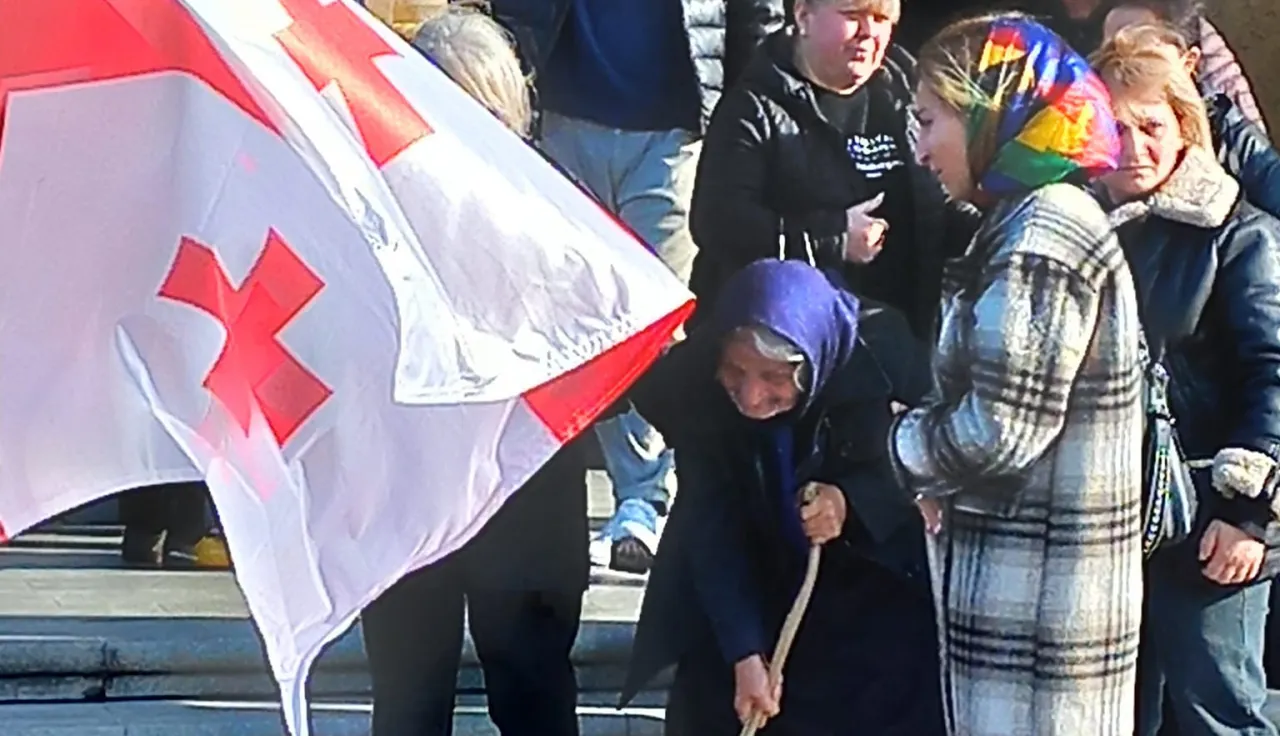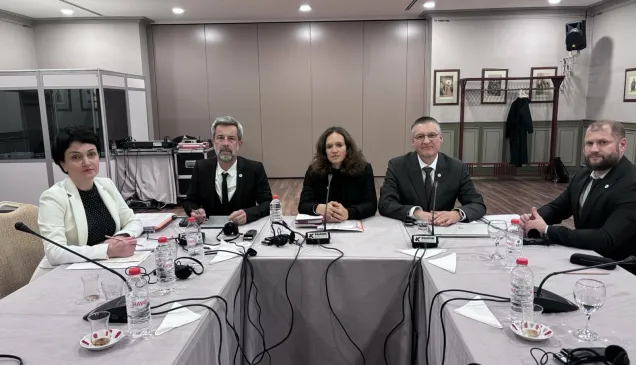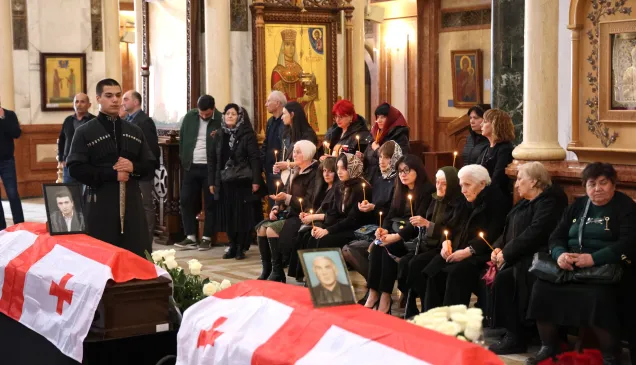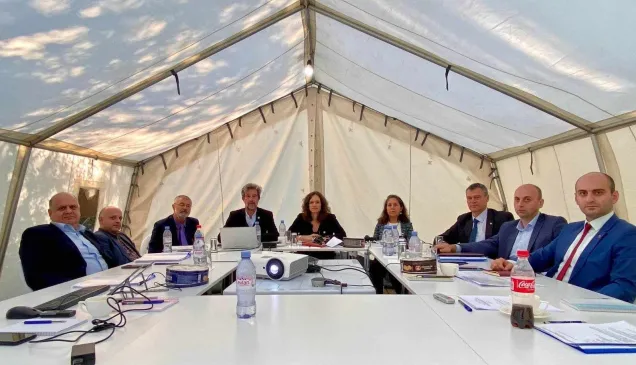Georgia: ICRC’s psychological support helps family process the death of missing loved one

Since the day Malkhaz Zedginidze left to fight in the war in Abkhazia, his family had one desire – to see him walk back through their door in Akhaltsikhe, Georgia, and to continue being the happy family they were before war changed everything.
The eldest among four siblings, Malkhaz had joined the 222nd battalion of the 22nd Motorized Rifle Brigade on 21 December 1992 and left for Abkhazia on 4 July 1993.
Sometime later though, the family was told by returning soldiers that Malkhaz had gone missing during an operation near Guma village on 7 July 1993. The soldiers said they had searched a lot but found no trace of Malkhaz and that he may been taken prisoner. Malkhaz's mother, Eteri, was convinced that her son was alive. "She would go to the Akhaltsikhe military base almost every day, hoping to get some news," says Ramaz, Malkhaz's brother.
In 2013, Ramaz heard that the International Committee of the Red Cross (ICRC) provided help to search for people unaccounted for as a result of armed conflicts and placed a request to get information about Malkhaz's whereabouts. "Meanwhile, Eteri also began participating in different activities of our accompaniment programme for families of missing people such as psychological support group sessions, commemorative events and forensic information sessions," says Tamta Kupatadze, Restoring Family Links field officer and in charge of the accompaniment programme at the ICRC.
As the years passed, Ramaz braced himself for the eventuality that Malkhaz may not be alive:
I only wanted to know the truth and find closure. But I was very worried for my parents, who were weak from old age and grief and were holding on to the hope of seeing Malkhaz one day.
"My mother refused to entertain any conversation about the possibility that Malkhaz may have died. Even my sisters believed that he would certainly return alive," says Ramaz.
Malkhaz's remains were identified in November 2023. His brother was very hesitant to tell the parents the truth thinking about how it would affect them. He had several conversations with Tamta, who decided to help Ramaz break the news to his family.
Breaking bitter news
"I won't forget 17 November 2023, when I visited the Zedginidze family. They greeted us warmly and Eteri commented half-jokingly that we would not have come for a good reason. I began by explaining the long and complex process involved in searching for a missing person and that many things have changed over the years. I also listened to what was their expectation when they had filled the search request form," says Tamta.
Eteri's first response was that she always felt that Malkhaz was out in the field and would return in a while. "But in the course of our conversation, she said she knew anything could have happened in a war and it would be a relief even to have a grave that they could visit. She said, 'Tell me everything'."
When news about Malkhaz was finally shared, Eteri not only listened carefully to all the details but also asked to see her son's remains to be absolutely sure:
I had to see his remains for my heart to accept what I had been told. I thought to myself that even if I realized that the remains were not of my son, I would still bury them in his name and take care of the grave.
At the end of the visit, the farewell was as warm as the welcome. "I believe, being part of the accompaniment programme had strengthened Eteri's resilience over the years and she was better prepared to face reality. Ramaz was relieved that we had got involved and helped him to carry a heavy emotional burden. He felt that his family would not have believed if he had shared the news and it could have even damaged their relationship," Tamta says.
Eteri eventually went to Levan Samkharauli National Forensic Bureau and saw the remains of her son and said goodbye. Later she thanked everyone who had contributed to the search and identification process. "It felt as if I saw him alive; as if I was at his wedding," she says.
Positive impact
Like the Zedginidze family, many others have received support through the accompaniment programme. While some have been able to start talking about their pain without shame or fear, others have been able to overcome their sense of guilt, develop a sense of acceptance and become part of a community that understands what they are going through. Tamta says the feedback they receive is also proof of the need and impact of the psychological support they provide.
Some of the comments that families of missing people shared are: "Here I talk about things I could not share with others because these people understand me"; "The pain is endless, but I have learned to live with it"; "I understand my family better and do not fight with them anymore"; "Now I dare to talk about my pain and emotions"; and "Thanks to this project I am able to live for my other children".
Accompaniment programme
The accompaniment programme in Georgia takes a multidisciplinary approach to the needs of the families of missing people who are facing ambiguity. Started in 2010, the programme consisted of various group and individual activities including social events, commemoration, psychological support, legal awareness and microeconomic initiative sessions, as well as awareness sessions on forensic activities and their emotional consequences, etc. Throughout the years interventions have been modified in accordance with the needs of families, some activities continue till today, while others have ceased or changed.
In 2023, Georgian authorities gradually took over the implementation of the accompaniment programme. Under the leadership of the State Ministry for Reconciliation and Civic Equality, 125 family members of missing people joined awareness sessions on the search and identification process and handover of missing file to the authorities, 270 family members participated in the International Day of the Disappeared on 30 August and 180 joined in the Day of Icon in the name of Missing Persons, marked on 8 December.
Relatives set up a chair for Eteri Zedginidze in the yard of Sameba Cathedral, where a public farewell was organized. Frail because of her age and health, she mustered all her strength to get up and say a final goodbye to her son and others whose remains were also identified as their coffins were being taken from the cathedral.



